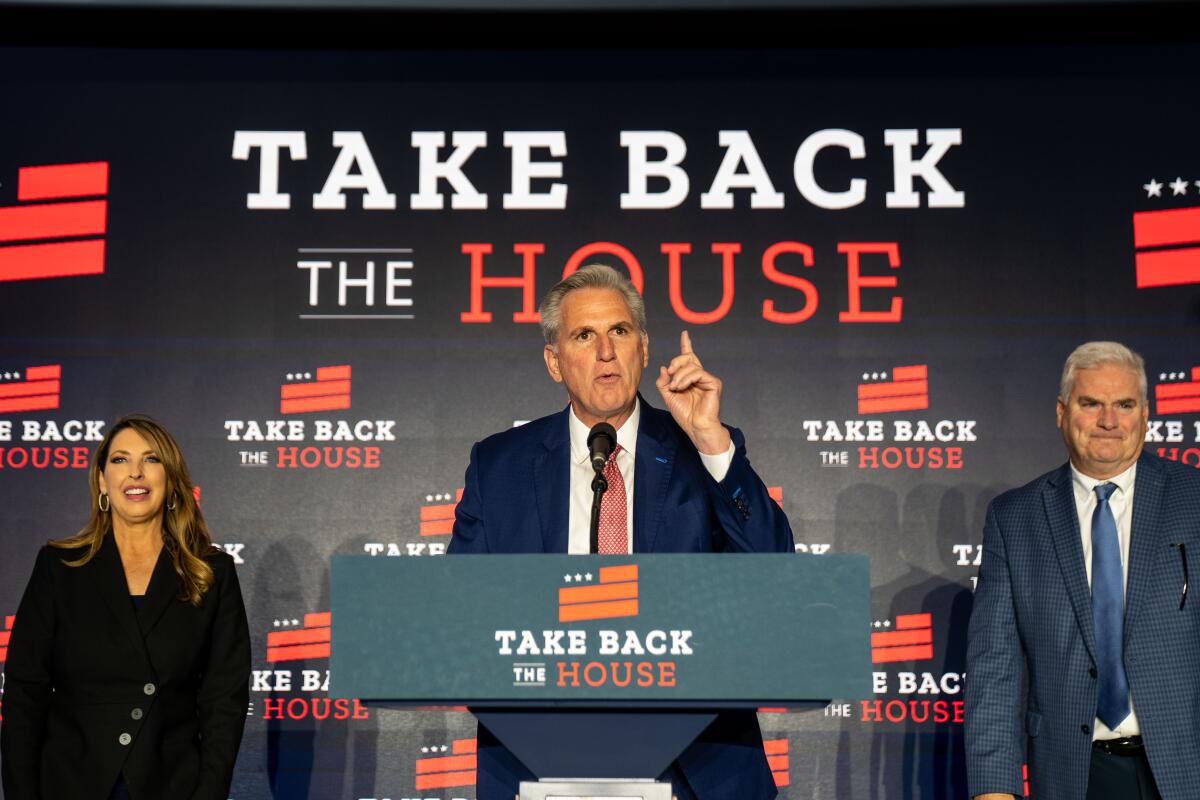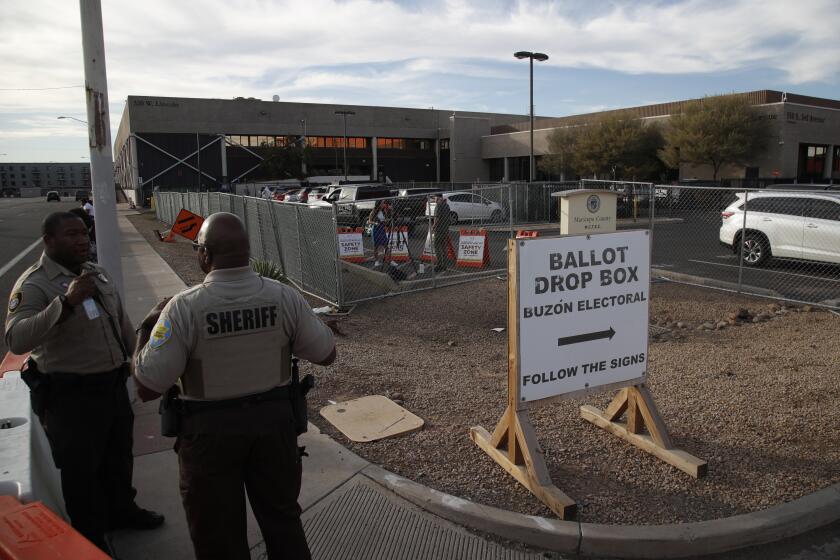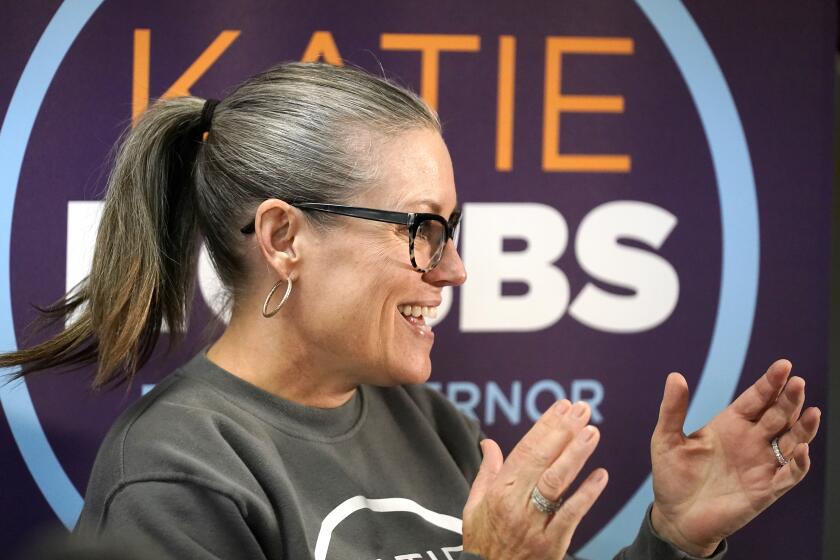Democrats defy history with control of Congress still up for grabs

- Share via
WASHINGTON — The balance of power in both houses of Congress was still in question Tuesday, defying the historical precedent of punishing losses for the president’s party and lending a fittingly uncertain air to the conclusion of this unsettled election season.
Republicans still appeared to have the upper hand to flip the five seats necessary to control the House, but their successes so far stopped short of a commanding “red wave” that would wash out endangered Democratic incumbents. And in the Senate, most marquee races remained on razor’s edge.
The known results so far paint a decidedly mixed picture on the mood of the country, far short of the “thumping” that President George W. Bush acknowledged after losing 30 seats in 2006 or the 63-seat “shellacking” Democrats took under President Obama in 2010.
While President Biden may have avoided a decisive referendum against his presidency, the prospect of Republicans holding at least one chamber of Congress throws his legislative agenda into peril and sharpens the questions over him seeking reelection in 2024.
“Part of what the midterm fallout means for the president depends in part on how large the House majority is for Republicans,” said John Hudak, a senior fellow of governance studies at the Brookings Institution.
“If the House majority is 15 or 20 seats ... it’s going to be difficult,” Hudak said. “He’s going to be investigated endlessly, they’re going to be passing a lot of legislation that he’s forced to veto, et cetera. But if the House majority is narrower, in the single-digit range, I think the chances of Republicans speaking with a unified voice is going to be quite limited.”
In Washington, what was meant to be a triumphant celebration of the incoming GOP House majority was decidedly more muted, as Rep. Kevin McCarthy delayed addressing the results for much of the night. When he finally did appear, McCarthy, the House Republican leader from Bakersfield, projected confidence.
“When we wake up tomorrow, we will be in the majority and Nancy Pelosi will be in the minority,” he said.
House Speaker Pelosi, meanwhile, emphasized the Republicans’ lackluster performance in a statement.
“While many races remain too close to call, it is clear that House Democratic members and candidates are strongly outperforming expectations across the country,” said Pelosi (D-San Francisco).
The results also underscored how former President Trump, even when out of the White House, remains a significant liability for his party. Trump wielded his endorsement to shape the contours of Republican primaries, resulting in a number of candidates at all levels of government that sputtered in the general election.
The most searing examples were in Pennsylvania, where Trump’s pick for governor, Doug Mastriano, lost badly to Democratic state Atty. Gen. Josh Shapiro. And Dr. Mehmet Oz, the television personality who was propelled by Trump’s endorsement to win the GOP nomination for the Senate, lost to Lt. Gov. John Fetterman, bolstering Democrats’ odds of holding the Senate.
Despite nationwide anxiety, there were no reports of political violence or widespread problems at the polls in the first major test of the country’s democracy since the Jan. 6, 2021, insurrection. Localized problems with voting machines were reported in the Phoenix area and some other jurisdictions.
Democrats hoped that alarms over democracy and the loss of nationwide abortion rights would help them preserve their 50-50 control of the Senate and also win several key governors races. But Republicans were bullish that inflation, crime and other day-to-day concerns, coupled with President Biden’s low approval ratings, would give their party an advantage.
Both parties found reason to cheer — and grimace — about early results.
In Florida, Gov. Ron DeSantis, who has signaled ambitions for the 2024 presidential race, sailed to an easy win in the onetime swing state. Republican Gov. Brian Kemp of Georgia also notched a decisive victory over Democratic challenger Stacey Abrams.
Elsewhere, two Democratic winners made history — Wes Moore as Maryland’s first Black governor and Maura Healey in Massachusetts as the first lesbian elected to lead a state. They replaced two of the nation’s few remaining moderate Republican officials, neither of whom were up for reelection.
In New Hampshire, Democratic Sen. Maggie Hassan won a second term, defeating retired Army Gen. Don Bolduc for a seat that was considered one of the most vulnerable to flipping Republican.
In the Georgia Senate race, the lead has seesawed by razor-thin margins between Democratic Sen. Raphael Warnock and his Republican challenger, Herschel Walker. They will face off in a December runoff if neither candidate clears the 50% threshold. With nearly 97% of Georgia precincts reporting, Warnock held a lead of under a percentage point Wednesday morning and was under the 50% threshold.
Tech investor Blake Masters in Arizona has consistently trailed incumbent Democratic Sen. Mark Kelly in early returns, although the race remained close. Kelly had 51.4% of the vote compared with Masters’ 46.4% Wednesday morning.
Another high-profile Senate race is in Nevada, where Democratic Sen. Catherine Cortez Masto faces a strong Republican challenger in former state Atty. Gen. Adam Laxalt. The incumbent was trailing Laxalt by more than 2% Wednesday morning.
Expecting to win the House and hoping to roll up a big margin, Republican campaign committees in the closing weeks of the election season poured money into races in blue states such as California and New York, putting Democrats on defense in territory Biden won solidly two years ago.
But in districts where the president narrowly won, some Democrats — such as Rep. Sharice Davids in Kansas and Rep. Vicente Gonzalez in Texas — showed surprising strength in securing reelection.
“This is a very unique cycle,” said David Wasserman, a congressional forecaster for the nonpartisan Cook Political Report. “It’s not an anti-incumbent election. It’s a red-state-versus-blue-state split screen.”
America has been through hard times before. But that’s little solace for voters worried about inflation, crime and abortion rights in this midterm election.
Many observers were focused on three House races in Virginia to project Republicans’ prospects. GOP candidate Jennifer Kiggans successfully ousted Democratic Rep. Elaine Luria in a district that Biden had won by 2 percentage points. But Rep. Abigail Spanberger, another vulnerable Democrat, fended off a challenge, and Rep. Jennifer Wexton appeared on track to do the same, giving Democrats some hope for a better-than-expected outcome nationwide.
Biden made a congratulatory call to Spanberger, as well as a handful of other Democratic politicians, on Tuesday night, according to the White House.
History and public opinion polls favored Republicans, especially in the House, where Democrats currently hold 220 seats, just two more than the 218 needed for a majority. In midterm elections since World War II, the president’s party has almost always lost seats.
A GOP majority in the House would likely elevate McCarthy, who now serves as minority leader, to the speakership he has coveted for years. It would almost certainly end the political career of Pelosi, one of the most consequential speakers in history.
The two parties entered election day virtually deadlocked on the generic congressional ballot, with voters preferring Republicans by a 1-point lead in the latest polling average by FiveThirtyEight.com.
The Senate, which the Democratic caucus controls with Vice President Kamala Harris’ tie-breaking vote, is harder to predict. That’s largely because several candidates who won Republican nominations with the backing of Trump and his supporters have struggled to gain an advantage over potentially vulnerable Democratic incumbents.
The Bakersfield congressman’s ideological flexibility, fundraising prowess and management of Donald Trump have helped him hold House Republicans together as they head into the midterm elections. Now he’s on the verge of gaining the prize he has long desired.
The election comes just days after an attack on Paul Pelosi, the speaker’s husband, heightened fears of more widespread political violence as Trump continues to spread the lie that he won the 2020 election.
The former president has promoted candidates who have helped him amplify that rhetoric, and who in many cases have vowed to change election rules at the state and local level. Even before Tuesday’s election, several states passed more restrictive voting laws and saw local election officials replaced by election deniers.
More than 340 candidates who espouse Trump’s false election conspiracies are on the ballot for federal, state and local offices, according to a tally by the Brookings Institution, a Washington-based think tank. That includes contenders for governor and secretary of state in Arizona and Michigan, who could upend how elections are run in those pivotal battleground states for the 2024 presidential race.
Despite pushes by conspiracy theorists and far-right groups to discredit the electoral process, Arizona election officials have expressed optimism and pride in the work they’ve done leading up to Tuesday.
Elaine Kamarck, a longtime Democratic strategist who is now a Brookings fellow, said the election deniers have run on platforms that vary in potential disruptiveness.
“Changing your early-voting dates from 10 days out to five days out, I don’t think it is going to hurt our democracy terribly much,” Kamarck said. More troubling, she said, “are the changes to who can certify elections and the politicization of election certification.”
The L.A. Times’ editorial board endorsements for statewide ballot measures, elected offices in Los Angeles city and county, L.A. Unified School District board, L.A. county superior court, statewide offices, the state Legislature and U.S. House and Senate seats.
A loss of control of either chamber of Congress could greatly imperil Biden’s agenda. Many Republicans say they plan to investigate him and his Cabinet secretaries, and some have threatened impeachment. McCarthy has also suggested that aid for Ukraine could be curtailed.
Losing control of the Senate would mean Biden would no longer be able to count on confirmation of his appointments to federal courts and executive agencies.
Republican control of the House would probably elevate McCarthy, but his hold on a potential speakership could be weak because his party is internally divided.
A majority-Republican House would probably try to leverage the debt ceiling to extract concessions from Democrats, possibly including cuts to Social Security and Medicare.
Democrats may use the lame-duck session between now and January, when a new Congress is sworn in, to head off some of the fights.
The overwhelming shift to vote-by-mail ballots fundamentally altered how Californians participate in elections. Ballot tabulation can extend for weeks afterward.
Even if Republicans were to control both chambers of Congress, they wouldn’t likely be able to pass major legislation of their own except in situations where a must-pass measure like the debt ceiling gives them leverage. The House is more conservative than the Senate and could pass legislation without any Democratic support. But Senate rules require 60 votes for most action, and Republicans almost certainly would not come close to that number. Plus Biden still has a veto pen.
Times staff writers Seema Mehta in Los Angeles and Arit John in Phoenix contributed to this report.
More to Read
Get the L.A. Times Politics newsletter
Deeply reported insights into legislation, politics and policy from Sacramento, Washington and beyond. In your inbox three times per week.
You may occasionally receive promotional content from the Los Angeles Times.


















